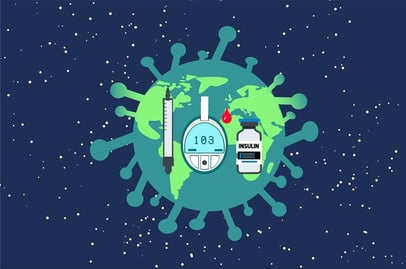Patients who suffer from type 1 or type 2 diabetes generally have a higher risk of a COVID-19 infection [1]. It therefore comes as no surprise that for patients with diabetes, the COVID-19 pandemic poses unprecedented challenges. As of August 2022, worldwide more than 587 million cases and over 6.4 million confirmed deaths due to the coronavirus have been reported to the WHO [2]. Of those, patients with diabetes are at an increased risk for a more rapid progression and bad prognosis of COVID-19 [3].
In a recent national cohort study in England, researchers found that patients with type 2 diabetes who were diagnosed with COVID-19 had a 23% increased risk of death, independent of age, sex, ethnicity, obesity, and other major comorbidities [4]. Furthermore, the higher preceding HbA1c levels are, the higher the risk of mortality is, as a UK analysis of national diabetes and mortality data before and during the pandemic revealed [5]. Poorly controlled diabetes prior to a COVID-19 infection may therefore worsen the prognosis for those patients.

Diabetes risk rises after COVID-19
Intriguingly, there are indications that patients who thus far have not been diagnosed with diabetes may also suffer from hyperglycemia and subsequently diabetes after a COVID-19 infection [6]. Indeed, a recent study showed a 40% increased risk of being diagnosed with, almost exclusively, type 2 diabetes within the first year in people who had been diagnosed with COVID-19 [7]. Even subjects with a mild, non-hospitalized form of COVID-19 had an excess 1-year burden of 8·28 per 1000 persons (95% CI 6·97–9·62). Another analysis of more than 2 million children in the U.S. showed greater type 1 and type 2 diabetes incidence rates of up to 2.5 times for children and adolescents who have had COVID-19 compared with a cohort without COVID-19 [8].
As COVID-19 can trigger an intense inflammatory response, subsequent hyperglycemia may be a consequence of severe disease [9]. Furthermore, the role of viral infections in the pathogenesis of type 1 diabetes has long been shown in animal models and additionally, some unusual forms of diabetes have already been associated with the presence of certain viruses in β cells [10, 11, 12]. Studies now show an increase in new-onset type 1 and type 2 diabetes after a COVID-19 infection [13, 14]. Potential pathways may include, but are not limited to, pancreatic β cell injury as SARS-CoV-2 infects and replicates in pancreatic cells, an exaggerated proinflammatory cytokine response, activation of the renin-angiotensin system (RAS), and changes in health behaviors during the pandemic [15, 16, 17].
Improving patient care
If COVID-19 proves to be a risk factor for diabetes, the implications are profound. In the U.S., diabetes is already the seventh leading cause of death which, as of 2019, around 37 million Americans suffered from, roughly 11% of the population [18]. The number of people who are diagnosed with diabetes in the U.S. are projected to increase to about 48 million in 2050, given that the present rate continues [19]. Should COVID-19 increase the incidence of diabetes, these numbers could multiply.
Future studies will hopefully help to understand the impact of COVID-19 on the risk of developing diabetes including the mechanisms at play. Identifying (modifiable) risk factors, screening patients with COVID-19 for signs of hyperglycemia and improving available treatment to fight these two pandemics – diabetes and COVID-19 – are crucial to help patients live better, healthier and longer lives.
Read more about our expertise in testing medical technology: Insulin pump development and design, artificial pancreas study and the AP@home project, glucose monitoring.




